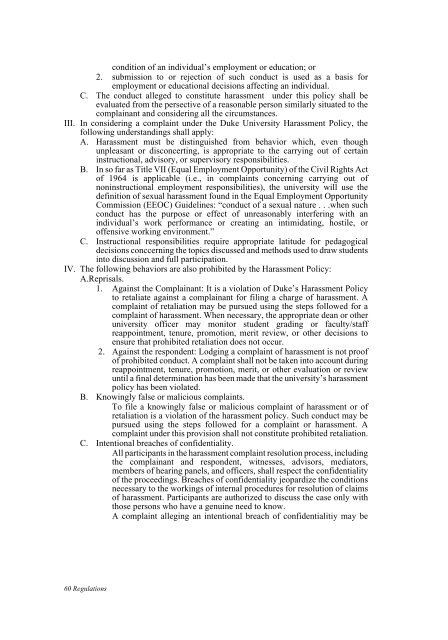2005-06 - Office of the Registrar - Duke University
2005-06 - Office of the Registrar - Duke University
2005-06 - Office of the Registrar - Duke University
Create successful ePaper yourself
Turn your PDF publications into a flip-book with our unique Google optimized e-Paper software.
condition <strong>of</strong> an individual’s employment or education; or<br />
2. submission to or rejection <strong>of</strong> such conduct is used as a basis for<br />
employment or educational decisions affecting an individual.<br />
C. The conduct alleged to constitute harassment under this policy shall be<br />
evaluated from <strong>the</strong> persective <strong>of</strong> a reasonable person similarly situated to <strong>the</strong><br />
complainant and considering all <strong>the</strong> circumstances.<br />
III. In considering a complaint under <strong>the</strong> <strong>Duke</strong> <strong>University</strong> Harassment Policy, <strong>the</strong><br />
following understandings shall apply:<br />
A. Harassment must be distinguished from behavior which, even though<br />
unpleasant or disconcerting, is appropriate to <strong>the</strong> carrying out <strong>of</strong> certain<br />
instructional, advisory, or supervisory responsibilities.<br />
B. In so far as Title VII (Equal Employment Opportunity) <strong>of</strong> <strong>the</strong> Civil Rights Act<br />
<strong>of</strong> 1964 is applicable (i.e., in complaints concerning carrying out <strong>of</strong><br />
noninstructional employment responsibilities), <strong>the</strong> university will use <strong>the</strong><br />
definition <strong>of</strong> sexual harassment found in <strong>the</strong> Equal Employment Opportunity<br />
Commission (EEOC) Guidelines: “conduct <strong>of</strong> a sexual nature . . .when such<br />
conduct has <strong>the</strong> purpose or effect <strong>of</strong> unreasonably interfering with an<br />
individual’s work performance or creating an intimidating, hostile, or<br />
<strong>of</strong>fensive working environment.”<br />
C. Instructional responsibilities require appropriate latitude for pedagogical<br />
decisions conccerning <strong>the</strong> topics discussed and methods used to draw students<br />
into discussion and full participation.<br />
IV. The following behaviors are also prohibited by <strong>the</strong> Harassment Policy:<br />
A.Reprisals.<br />
1. Against <strong>the</strong> Complainant: It is a violation <strong>of</strong> <strong>Duke</strong>’s Harassment Policy<br />
to retaliate against a complainant for filing a charge <strong>of</strong> harassment. A<br />
complaint <strong>of</strong> retaliation may be pursued using <strong>the</strong> steps followed for a<br />
complaint <strong>of</strong> harassment. When necessary, <strong>the</strong> appropriate dean or o<strong>the</strong>r<br />
university <strong>of</strong>ficer may monitor student grading or faculty/staff<br />
reappointment, tenure, promotion, merit review, or o<strong>the</strong>r decisions to<br />
ensure that prohibited retaliation does not occur.<br />
2. Against <strong>the</strong> respondent: Lodging a complaint <strong>of</strong> harassment is not pro<strong>of</strong><br />
<strong>of</strong> prohibited conduct. A complaint shall not be taken into account during<br />
reappointment, tenure, promotion, merit, or o<strong>the</strong>r evaluation or review<br />
until a final determination has been made that <strong>the</strong> university’s harassment<br />
policy has been violated.<br />
B. Knowingly false or malicious complaints.<br />
To file a knowingly false or malicious complaint <strong>of</strong> harassment or <strong>of</strong><br />
retaliation is a violation <strong>of</strong> <strong>the</strong> harassment policy. Such conduct may be<br />
pursued using <strong>the</strong> steps followed for a complaint or harassment. A<br />
complaint under this provision shall not constitute prohibited retaliation.<br />
C. Intentional breaches <strong>of</strong> confidentiality.<br />
All participants in <strong>the</strong> harassment complaint resolution process, including<br />
<strong>the</strong> complainant and respondent, witnesses, advisors, mediators,<br />
members <strong>of</strong> hearing panels, and <strong>of</strong>ficers, shall respect <strong>the</strong> confidentiality<br />
<strong>of</strong> <strong>the</strong> proceedings. Breaches <strong>of</strong> confidentiality jeopardize <strong>the</strong> conditions<br />
necessary to <strong>the</strong> workings <strong>of</strong> internal procedures for resolution <strong>of</strong> claims<br />
<strong>of</strong> harassment. Participants are authorized to discuss <strong>the</strong> case only with<br />
those persons who have a genuine need to know.<br />
A complaint alleging an intentional breach <strong>of</strong> confidentialitiy may be<br />
60 Regulations









